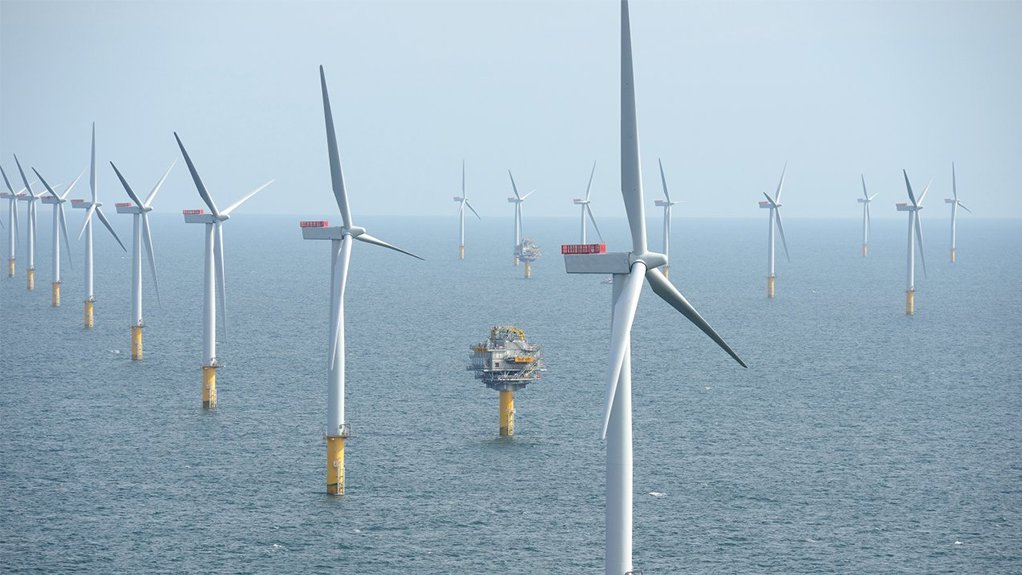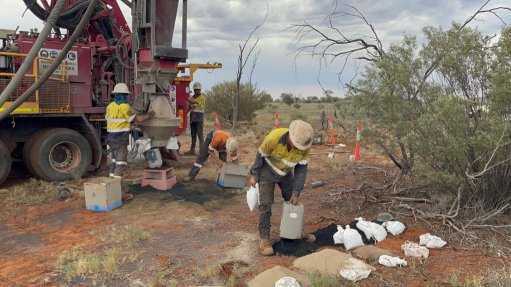Mining, refining, smelting investment of up to $4tr by 2030 needed to support net-zero shift – report


Report highlights the relative materials intensity of technologies required for the net-zero transition, such as offshore wind turbines
As the world accelerates the deployment of climate technologies in support of the net-zero transition, there is a risk that materials supply might not scale at the required speed, a new McKinsey & Company report warns.
To meet demand for minerals and metals used in battery electric vehicles (BEVs), wind turbines, solar panels and electrolysers, the report states that mining project development will need to far exceed historical growth rates, while the pace of exploration will also have to accelerate.
Investments in mining, refining and smelting will need to increase to about $3-trillion to $4-trillion by 2030, or about $300-billion to $400-billion a year, including capital expenditure for exploration and new and ongoing projects.
Likewise, such a scale-up will require smooth permitting processes, timely infrastructure deployment, equipment availability and adequate water resources.
“Labour capacity will also need to be increased by 300 000 to 600 000 specialised mining professionals, which could be particularly challenging given the recent decline in the number of mining engineering graduates,” the report warns.
There is also a requirement for an additional 200 GW to 500 GW of energy by 2030 to power these mining and processing assets, which will be equivalent to 5% to 10% of estimated solar and wind power capacity by 2030.
The report highlights the relative materials intensity of the key technologies required for the net-zero transition, with an offshore-wind turbine calculated to be some six times more materials-intensive than a gas-based installation on a megawatt basis, while BEVs are 15% to 20% heavier than internal combustion engine vehicles on average.
In addition, lower-carbon technologies require a new suite of materials that have been produced in only limited quantities in the past, such as lithium, a critical battery material, or rare-earth elements such as dysprosium and neodymium, which are used in permanent magnets.
The report forecasts that, while some materials such as nickel may experience modest shortages of between 10% and 20%, others such as dysprosium, a magnetic material used in most electric motors, could see shortages of up to 70% of demand.
Security of supply could also be affected by the fact that the supply of some of these materials is concentrated in a handful of countries, including for example China (rare-earth elements), the Democratic Republic of Congo (cobalt) and Indonesia (nickel).
“Combined with a regulatory landscape that is increasingly focused on regionalisation – as seen through the US Inflation Reduction Act and the EU Green Deal Industrial Plan, for example – these concentrated supplies could affect regional access to materials within the scope of certain agreement areas, even when the global market is balanced.”
The authors argue that, unless mitigation actions are put in place, shortages could hinder the global speed of decarbonisation as customers will be unable to shift to lower-carbon alternatives.
“Moreover, these shortages would lead to price spikes and volatility across materials, which in turn would make the technologies in which they are embedded more expensive and further slow adoption rates.”
With 72 countries, covering 82% of global emissions, having committed to net-zero emissions, several large consuming and producing countries have published critical minerals lists, while the International Energy Agency has started producing a yearly ‘Critical Minerals Market Review’, reflecting the importance of metals and minerals to the energy transition.
In South Africa, Mineral Resources and Energy Minister Gwede Mantashe has announced that government is developing a critical minerals strategy to support the development of domestic and global value chains for the green economy.
“It’s crucial to ensure the timely scale-up of projects that have already been announced so far, whilst also protecting future demand,” McKinsey & Company senior partner Michel Van Hoey argues.
“This will require mining for materials to exceed beyond historical growth rates, while at the same time doubling down on exploration to ensure further scale up of supply beyond 2030.”
Article Enquiry
Email Article
Save Article
Feedback
To advertise email advertising@creamermedia.co.za or click here
Announcements
What's On
Subscribe to improve your user experience...
Option 1 (equivalent of R125 a month):
Receive a weekly copy of Creamer Media's Engineering News & Mining Weekly magazine
(print copy for those in South Africa and e-magazine for those outside of South Africa)
Receive daily email newsletters
Access to full search results
Access archive of magazine back copies
Access to Projects in Progress
Access to ONE Research Report of your choice in PDF format
Option 2 (equivalent of R375 a month):
All benefits from Option 1
PLUS
Access to Creamer Media's Research Channel Africa for ALL Research Reports, in PDF format, on various industrial and mining sectors
including Electricity; Water; Energy Transition; Hydrogen; Roads, Rail and Ports; Coal; Gold; Platinum; Battery Metals; etc.
Already a subscriber?
Forgotten your password?
Receive weekly copy of Creamer Media's Engineering News & Mining Weekly magazine (print copy for those in South Africa and e-magazine for those outside of South Africa)
➕
Recieve daily email newsletters
➕
Access to full search results
➕
Access archive of magazine back copies
➕
Access to Projects in Progress
➕
Access to ONE Research Report of your choice in PDF format
RESEARCH CHANNEL AFRICA
R4500 (equivalent of R375 a month)
SUBSCRIBEAll benefits from Option 1
➕
Access to Creamer Media's Research Channel Africa for ALL Research Reports on various industrial and mining sectors, in PDF format, including on:
Electricity
➕
Water
➕
Energy Transition
➕
Hydrogen
➕
Roads, Rail and Ports
➕
Coal
➕
Gold
➕
Platinum
➕
Battery Metals
➕
etc.
Receive all benefits from Option 1 or Option 2 delivered to numerous people at your company
➕
Multiple User names and Passwords for simultaneous log-ins
➕
Intranet integration access to all in your organisation



















